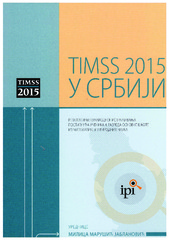Приказ основних података о документу
Значај раног учења за постигнуће ученика из математике
The importance of early learning for student achievement in mathematics
| dc.contributor | Марушић Јаблановић, Милица | |
| dc.contributor | Гутвајн, Николета | |
| dc.contributor | Јакшић, Ивана | |
| dc.creator | Радишић, Јелена | |
| dc.creator | Шева, Нада | |
| dc.date.accessioned | 2021-09-15T09:12:14Z | |
| dc.date.available | 2021-09-15T09:12:14Z | |
| dc.date.issued | 2017 | |
| dc.identifier.isbn | 978-86-7447-131-9 | |
| dc.identifier.uri | http://ipir.ipisr.org.rs/handle/123456789/617 | |
| dc.description.abstract | In this paper we present the initial data analyses regarding home environment characteristics that included information from: 1. students’ questionnaire; and 2. early learning survey (parental questionnaire attained for the first time for Serbian population in TIMSS 2015). The analyses were based on the composite variables, generated under IAE international survey of TIMSS 2015: (a) resources for learning in home environment; (b) parental practices concerning the development of students’ early literacy and mathematical competencies; (c) parental attitudes towards mathematics and science as well as school quality in general; (d) parental estimates on initial students’ linguistic and mathematical competencies at the beginning of primary school; (e) the duration of the student’s preprimary attendance. The purpose of these analyses was to determine: (1) to what extent the variables listed above predict fourth-grade students’ achievement on the TIMSS 2015 mathematics assessment and (2) whether there are diverse groups of students when it comes to their parental early numeracy practices as well as the richness of home numeracy environment and, consequently, whether there are differences in the academic achievement of the students from the identified groups. The results of the linear regression (the enter method) show that according to the mathematics achievement domain, these variables explain between 22- 30% of students’ academic achievement variance. The following variables proved to be the strongest predictors: the home environment resources, parental assessment of the children’s initial competencies as well as the preschool program attendance duration. The attitudes of parents did not play a significant role in students’ academic achievements, whereas a single negative relationship was established in terms of practices - the one between the activity concerning early literacy development and data presentation. The hierarchical clustering analysis (the Ward Method) which involved the parents’ practices variables, the richness of home resources as well as parental assessment of children’s skills in early literacy and numeracy showed that the students could be divided into four groups: group 1– the competent ones (31%) (a high score on resource scale, skills before school and an average score on the scale of parents’ practices frequency); group 2 – experience and knowledge (17.8 %) (a high score on resource scale, skills before school (though with a slightly lower score concerning mathematics competencies) and the highest scores concerning parents’ activities); group 3 – without resources and with lower skills (the scores of all variables were below average values); group 4 – the average ones (41.4%) (an average score on resource and activities’ scale and below average score on skills before school scale). | sr |
| dc.language.iso | sr | sr |
| dc.publisher | Београд : Институт за педагошка истраживања | sr |
| dc.relation | info:eu-repo/grantAgreement/MESTD/Basic Research (BR or ON)/179034/RS// | sr |
| dc.relation | info:eu-repo/grantAgreement/MESTD/Integrated and Interdisciplinary Research (IIR or III)/47008/RS// | sr |
| dc.rights | openAccess | sr |
| dc.rights.uri | https://creativecommons.org/licenses/by/4.0/ | |
| dc.source | TIMSS 2015 у Србији : међународног истраживања постигнућа ученика 4. разреда основне школе из математике и природних наука | sr |
| dc.subject | early learning | sr |
| dc.subject | mathematics | sr |
| dc.subject | parental practices and attitudes | sr |
| dc.subject | home resources | sr |
| dc.subject | TIMSS 2015 | sr |
| dc.title | Значај раног учења за постигнуће ученика из математике | sr |
| dc.title | The importance of early learning for student achievement in mathematics | sr |
| dc.type | bookPart | sr |
| dc.rights.license | BY | sr |
| dc.citation.epage | 114 | |
| dc.citation.spage | 95 | |
| dc.description.other | Назив збирке: Библиотека „Педагошка теорија и пракса“ 44 | sr |
| dc.identifier.fulltext | http://ipir.ipisr.org.rs/bitstream/id/1858/Znacaj_ranog_ucenja_2017.pdf | |
| dc.identifier.rcub | https://hdl.handle.net/21.15107/rcub_ipir_617 | |
| dc.type.version | publishedVersion | sr |

